- Echanges et mise en réseau
- Connaissance et apprentissage
- Plaidoyer
- Nos thèmes
Nous sommes convaincu∙e∙s que la santé sexuelle des jeunes est toujours traitée avec négligence et qu’elle n’a pas la place qu’elle mérite. Notre solution pour y remédier : lancer des programmes et des projets innovants et participatifs ! Des projets innovants reflétant l’esprit actuel des jeunes, qui vont les chercher dans leur environnement, qui les renforcent dans leur potentiel et qui leur ouvrent des perspectives.
L’année dernière, notre colloque sur le thème « Sexual health and rights under pressure: resistance and challenges » (Santé et droits sexuels sous pression : résistance et défis) a clairement établi que les tabous et les blocages en matière de santé sexuelle se renforcent dans le monde entier. Les milieux et courants tant conservateurs que fondamentalistes refusent aussi aux jeunes l’accès à des informations précieuses en ce qui concerne leur développement sexuel.
Pour lutter contre ces normes restrictives et ces tabous qui se multiplient, des approches innovantes, idéalement initiées par les adolescent∙e∙s et les jeunes eux-mêmes, sont indispensables. Ils ont besoin de visions qui les séduisent pour pouvoir s’engager dans ce changement social. Ils∙elles doivent être directement interpellé∙e∙s, par exemple par des problèmes ou des questions les concernant, et prendre conscience de comment leur solution ou leur approche peut faire la différence. Ces visions doivent également refléter leurs valeurs, leur authenticité et leur crédibilité en tant que leaders d’opinion.
Notre colloque du 24 avril 2024 à Berne est précisément consacré à ce thème : nous y présenterons des approches innovantes, peu coûteuses et issues du terrain. Découvrez comment l’utilisation de la « photo voice », en passant par la cyberviolence, jusqu’à une application développée localement en Éthiopie, peut changer la réalité de la vie des jeunes. Un projet « Game Changer » passionnant portant sur l’entrepreneuriat des jeunes en Zambie sera également présenté.
Et nous pouvons déjà annoncer que le Dr Venkatraman Chandra-Mouli, ancien collaborateur de l’OMS, viendra parler de programmes innovants en matière d’éducation sexuelle. Nous sommes impatients de vous retrouver lors d’un colloque inspirant, qui soulignera les controverses et développera des idées. Comme toujours à l’hôtel Kreuz à Berne.
Inscrivez-vous dès maintenant !
Carine Weiss
Réseau Medicus Mundi Suisse
E-Mail

Medicus Mundi Suisse Collectivement, les jeunes ont des besoins urgents et considérables en matière de politiques et de programmes qui garantissent l'amélioration de de leur santé sexuelle et reproductive et les droits qui y sont associés. Il existe actuellement de nombreuses initiatives et projets innovants visant à l’améliorer et nous voulons en entendre parler.
Summary of the Symposium 8 February 2024
"Access to drugs, diagnostics and vaccines remains a challenge in many in low- and middle-income countries. Today, 8 February 2024, Swiss TPH hosted a symposium bringing together 350 experts and key players from academia, the pharmaceutical industry, politics and product development partnerships to assess current strategies and foster synergies in research, drug development and medicines’ implementation.
On December 15, 2023, the World Health Organization officially added noma to the list of neglected tropical diseases, which will make it easier to combat and research this poverty-related disease. Swiss TPH and the University of Basel both played a key role in ensuring noma was recognized in this manner. By Christian Heuss
"Many people prefer to look the other way when it comes to this disease, as the sight of young children suffering from its effects is unbearable. It causes open wounds on the face and whole sections of the cheek appear to have been eaten away. Children who survive the disease remain disfigured throughout their lives and struggle with speech disorders and eating problems. Noma typically affects children between two and six years of age. The disease starts seemingly harmless as sore gums and mild bad breath. At this stage, the disease would be easy to cure with a broad-spectrum antibiotic. If left untreated, the infection spreads to tissue necrosis within a few days. First soft tissues die, then cartilage structures and bones are attacked and literally eaten away by the infection."
"Nicaragua has one of the highest teenage pregnancy rates in the world. Violence against girls and women is also a daily occurrence. With our work, we help to promote the holistic development of young people, strengthen their right to a life free from violence and support the practice of safe and self-determined sexuality."

Pharmaciens Sans Frontières Suisse fait appel à vous pour rejoindre son équipe le dimanche 2 juin 2024 à Genève lors de la course Race for Gift !
"Il s’agit d’une course/marche caritative pour laquelle vous mobilisez votre réseau afin de récolter des fonds qui financeront le travail de PSF Suisse. En participant à Race for Gift, vous apportez une contribution précieuse à l’association qui a pour mission l’accès aux soins de qualité, partout et pour tous·tes, sans aucune discrimination. Forte de plus de 30 ans d'expérience, PSF Suisse développe des projets de coopération au développement au Liban, à Madagascar, en Tanzanie, au Soudan du Sud et en Suisse. Toutes les informations sur nos projets sont à retrouver sur notre site psf.ch."
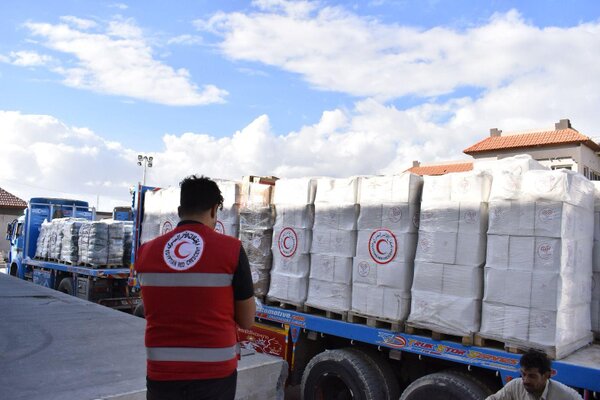
"A Gaza, le conflit perdure et la crise humanitaire continue de s’aggraver. En effectuant quotidiennement des livraisons de biens de première nécessité depuis l’Egypte, le Mouvement international de la Croix-Rouge et du Croissant-Rouge met tout en œuvre pour atténuer la détresse des victimes. La Croix-Rouge suisse (CRS) participe aux secours, notamment en dépêchant des spécialistes de son pool d’aide d’urgence."

"Deux ans après l’escalade du conflit en Ukraine, la Croix-Rouge suisse poursuit ses activités en faveur des personnes déplacées ou exilées. En Suisse, elle soutient leur intégration. En Ukraine, elle vient en aide aux personnes déplacées qui ont tout perdu."
"L'utilisation massive d'armes explosives en Ukraine a détruit des routes, des hôpitaux, des écoles et isolé des régions entières. Nous attirons l'attention sur les dangers liés aux munitions non explosées ainsi que sur les besoins exacerbés des personnes qui n’ont pas pu fuir les zones de combat."
Glissez-vous dans la tenue de protection de nos démineurs et démineuses au Sénégal pour vivre une journée à leurs côtés.
"Lever à l’aube : Les équipes de déminage commencent tôt, pour arrêter avant les heures les plus chaudes. Première étape au bureau : chargement du matériel dans les véhicules. Pour rejoindre le village de Kouring à quarante minutes de route. La Casamance compte aujourd’hui encore de nombreuses zones dangereuses, polluées par des engins explosifs. De plus, outre les risques inhérents au métier, il fallait composer jusqu’à récemment avec la menace de groupes armés. Pour prévenir de tels incidents, nous nous assurons que toutes les mesures soient prises pour garantir la sécurité de nos équipes."
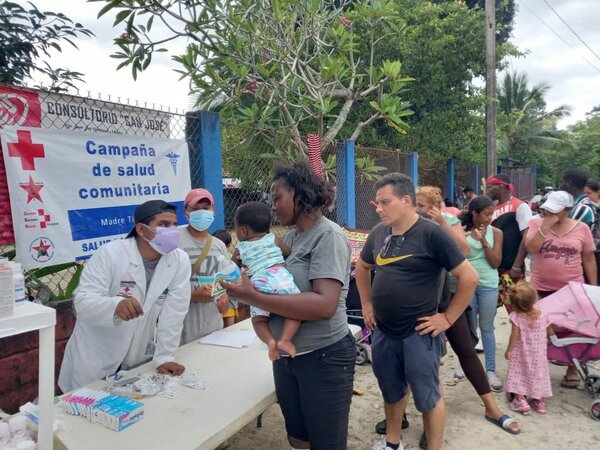
Le bulletin nº190 de mars 2024 de la CSSR
"La CSSR transmet volontiers l'information suivante: La Centrale Sanitaire Suisse Romande publie son premier bulletin de l'année. Un bulletin sur le droit international et ses échecs, sur son nouveau projet au Mexique avec son partenaire Madre Tierra Mexico, sur les messages des autorités suisses vis-à-vis du Nicaragua, et sur la situation politique qui se détériore en Équateur. On vous souhaite une bonne lecture!"
"Der Bundesrat verabschiedete am 24. Januar seinen Zwischenbericht zur Umsetzung der Agenda 2030 für nachhaltige Entwicklung sowie den dazugehörigen Aktionsplan für die Jahre 2024 bis 2027. Konkrete und wirksame Massnahmen fehlen. Und einmal mehr werden Menschen mit Behinderungen im globalen Süden zurückgelassen. Die zivilgesellschaftliche Plattform Agenda 2030 nahm noch am selben Tag zum Zwischenbericht und zum Aktionsplan Stellung. Als Mitglied der Kerngruppe der Plattform Agenda 2030 teilt die CBM Christoffel Blindenmission Schweiz deren Enttäuschung."

"Ghana’s Parliament unanimously passed one of the world’s most draconian anti-LGBTIQ Bills on Wednesday, including a mandatory three-year prison sentence for a person who simply “identifies” as lesbian, gay, bisexual, transgender, intersex or queer. Anyone funding an LGBTIQ organisation also faces five years in prison, while LGBTIQ “advocacy” involving children will result in a 10-year prison sentence – a clause that is so wide it could be applied to sex education in schools. Any media that reports or broadcasts anything related to LGBTQ+ people or activities also face fines and possible prison sentences."

Classification of the “international LGBT movement” as an extremist organisation is likely to worsen mental and sexual health. Ed Holt reports.
“It's hard to imagine what the state could do to make things more difficult for LGBT people in Russia. Before, there was hatred for LGBT people at a societal level, but now the state has declared something that doesn’t even exist to be a terrorist organisation. It's terrifying”, said Dominik (name has been changed for safety reasons). An LGBT activist in St Petersburg, Dominik, like many other members of Russia's LGBT community, is coming to terms with a ruling by the Russian Supreme Court on Nov 30, 2023, declaring the “international LGBT movement” an extremist organisation."
As countries work to reach the goal of ending AIDS as a public health threat by 2030, planning is urgently needed for sustaining the gains from the HIV response beyond 2030.
"With that in mind, UNAIDS has released the “HIV Response Sustainability Primer” which proposes a new approach to ensure the sustainability of the HIV response. This holistic approach includes programmatic, political, policy-related and financial aspects of the HIV response. The new Primer provides the rationale, the definitions, and an in-depth explanation of this new sustainability approach. “The moment is right, the imperative is now, the global HIV community must come together to dialogue about what is needed to sustain the HIV response by and beyond 2030,” says Jaime Atienza, Director of Equitable Financing at UNAIDS. “We are calling on leaders to initiate national conversations about the future state of a sustained HIV response, and the transformations needed to achieve and sustain impact, by and beyond 2030, including looking at the policy changes, donor commitment and investments needed to translate them into results and concrete changes at country level.”

"The U.S. President’s Emergency Plan for AIDS Relief (PEPFAR), led by the State Department’s Bureau of Global Health Security and Diplomacy, announced a new $20 million initiative to strengthen youth-focused HIV programming, center youth HIV leadership, and promote innovation in HIV prevention, case finding, and treatment outcomes in PEPFAR-supported countries. Ambassador Dr. John Nkengasong, U.S. Global AIDS Coordinator and Senior Bureau Official for Global Health Security and Diplomacy, made the announcement about PEPFAR’s Youth Initiative during a hybrid youth special session in Cape Town, South Africa, alongside thousands of youth from around the world."

"Divyanshi is an enthusiastic 18-year-old Indian girl with an inspiring personal story of courage and resilience. She was diagnosed with HIV at a very young age. She has never given up on her dreams. “I became aware of my status around 2013-14 but it wasn’t until I moved to a care home that I understood the challenges of living with this virus,” said Divyanshi. “As a person living with HIV, I face stigma and discrimination when a friend or someone else gets to know about my positive status. But I take it as an opportunity to educate people about HIV and break their myths. I want to show the world that I can live a normal, healthy, and happy life as a person living with HIV.”
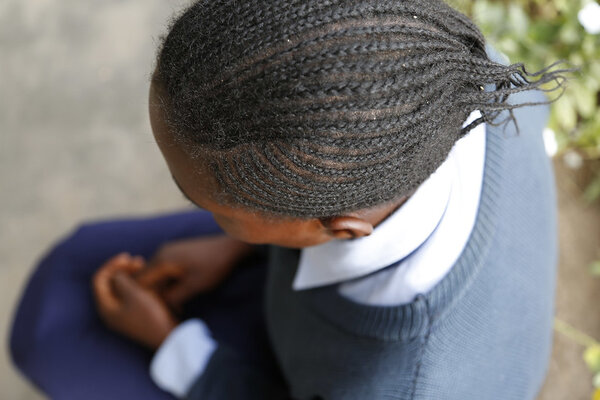
Pregnant Girls’ and Adolescent Mothers’ Struggles to Stay in School in Mozambique
"Mozambique’s government faces enormous challenges in advancing adolescent girls’ and women’s right to education. Many girls face discrimination, gender-based violence, and poverty. The country has the fifth highest rate of child marriage in the world. Its adolescent pregnancy rate is the highest in East and Southern Africa: 180 out of 1000 girls and young women ages 15 to 19 gave birth in 2023, in contrast with the regional average of 94 births “GIRLS SHOULDN’T GIVE UP ON THEIR STUDIES” 2 per 1000 girls. At least 1 in 10 girls has had a child before the age of 15, according to the United Nations. A 2019 study of data collected over time of primary school dropouts in Mozambique found that 70 percent of pregnant girls, many of whom were still enrolled in primary school past puberty due to their late enrollment, dropped out of school."

The production licensing agreement between the Population Council and Kiara Health, a South Africa-based pharmaceutical manufacturing and health solutions company, will increase regional supply to 1 million PreP rings annually.
"Good news for the thousands of girls and women in the sub-Saharan Africa region: A new licensing agreement is set to double the continental supply of a game-changing, long-acting HIV prevention tool. Made of flexible silicone, the dapivirine vaginal ring, or DPV-VR, which slowly releases the antiretroviral drug dapivirine in the vagina over one month, is the first long-acting HIV prevention method that is approved for use in women aged 18 and above. It has been described as an HIV prevention “breakthrough” and is reported to reduce the risk of HIV infection in women by over 50%."

"We, sixteen representatives of communities affected by tuberculosis (TB) and with experience related to TB in pregnancy, met in Washington, D.C., on October 25– 28, 2023, to develop a consensus on the inclusion of pregnant and breastfeeding women and persons* in TB treatment and vaccines research. The community meeting was part of a larger convening hosted by the Supporting, Mobilizing, and Accelerating Research for Tuberculosis Elimination (SMART4TB) Consortium, the International Maternal Pediatric Adolescent AIDS Clinical Trials (IMPAACT) Network, and the World Health Organization (WHO) Global TB Program (Tuberculosis and pregnancy: Laying the groundwork for consensus on inclusion in research)."

Un appel de Philippe Neyroud, ancien directeur de Comundo Suisse romande, et de deux journalistes, Marisol Hofmann et Thomas Niederberger.
Active en Bolivie comme au Pérou, l’organisation Comundo constate, avec ses coopérant·e·s Marisol Hofmann et Thomas Niederberger, tous deux journalistes, l’impact en termes de santé publique provoqué ici par l’usage indiscriminé et abusif de pesticides dans l’agriculture, là par les dégâts environnementaux dus à l’extraction minière. Deux réalités et un point commun : l’implication avérée d’entreprises multinationales suisses.

Interview de l’experte en développement durable Eva Schmassmann par Helvetas
"Les ambitions sont trop faibles, les progrès trop limités. A ce rythme, la Suisse n’atteindra pas les objectifs de l’Agenda 2030 pour le développement durable. Nous avons parlé des points faibles du nouveau plan d’action 2024-2027 et de ce qu’il faudrait pour que la Suisse atteigne quand même les ODD. La question : Eva Schmassmann, où en est la Suisse dans la mise en œuvre de l’Agenda 2030? La répons : Dans l’ensemble, la Suisse n’est pas en bonne voie pour mettre en œuvre le programme de développement durable de l’ONU. C’est ce qu’avait déjà montré le rapport national qu’elle avait présenté en 2022 devant la communauté internationale réunie à New York. Dans ce rapport, le Conseil fédéral faisait une autocritique: «Le rythme n’est pas suffisant. Dans certains domaines, la direction n’est même pas la bonne, la Suisse s’éloigne de la réalisation de certains ODD»."

"Le Conseil fédéral a présenté aujourd'hui les chiffres clés du budget 2025. Il prévoit notam-ment une réduction de 1.4% de la coopération internationale (CI). L'an dernier encore, il avait envisagé une augmentation de 2,5% dans le message sur la CI 2025 - 2028, afin de financer la reconstruction de l'Ukraine. Le Conseil fédéral n'a qu'une solution pour sortir de l’impasse : il doit tenir compte de la consultation relative au message sur la CI et financer la reconstruction de l’Ukraine à titre extraordinaire."

Avec 4 à 5 milliards de personnes dans le monde qui n'ont pas accès aux services de santé les plus élémentaires, la communauté internationale en charge de la santé globale ne peut pas se permettre de se réunir lors de la prochaine réunion de haut niveau des Nations unies sur les CUH en 2027 et de déplorer à nouveau le manque de progrès.
L'article discute des défis liés à la mise en œuvre de la couverture sanitaire universelle (CSU). Il souligne que bien que de nombreux pays se soient engagés à offrir une couverture sanitaire universelle d'ici 2030, les progrès dans ce domaine ont stagné, voire diminué. Il identifie quatre problèmes principaux, appelés "éléphants dans la pièce", qui doivent être abordés afin de relancer les progrès en matière de CSU. Le premier éléphant symbolise le manque d'engagement politique. De nombreux gouvernements considèrent que la réalisation de la CSU est du ressort du seul secteur de la santé, alors qu'en réalité, elle nécessite la collaboration de différents secteurs. Le deuxième éléphant est l'insuffisance et la fragmentation du financement. Le troisième obstacle est le manque de gouvernance et la fragmentation continue des efforts mondiaux en matière de santé, malgré les tentatives de renforcer la cohérence aux niveaux mondial et national, par exemple, par le biais du Plan d'action mondial sur l'ODD 3"SDG 3 Global Action Plan". Le 4e point crucial est la manière dont on communique sur la CSU. La communauté internationale en matière de santé est fragmentée en différentes factions qui défendent des priorités différentes. Elle doit cependant communiquer clairement aux décideur∙euses politiques ce qu'est la CSU, afin qu'ils∙elles soient en mesure de financer des feuilles de route réalisables.
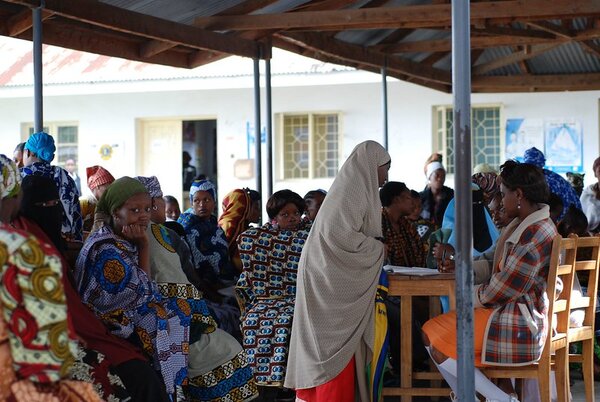
"Challenges related to availability and access to good quality healthcare services contribute to about 15% of deaths in low and middle-income countries (LMICs). However, the attention to quality healthcare in many countries has not been adequate, albeit rising over the years. Several studies highlight challenges in healthcare quality, including the availability of health services, clinical care and patient experience. Recently, a study from Uttar Pradesh (UP) in India analysed the reasons behind significantly higher mortality in newborn babies born in rural private health facilities compared to childbirths in public and private facilities in urban areas. In line with many other observations, the paper has highlighted several reasons relevant to the issue of suboptimal quality of healthcare in LMICs, indicating several systemic and policy challenges."

Global health institutions, controlled by a small group of countries and private foundations, have a fundamental design flaw and they are not fit for purpose. Olusoji Adeyi of Johns Hopkins and Justice Nonvignon of African CDC offer a prescription for donors.
"After decades of lofty promises, mixed successes, catastrophic failures, and billions of dollars spent, the time is ripe to fundamentally change the construct and duration of global health grant-financing institutions and initiatives (GHIs). We acknowledge that GHIs – including multilaterals, bilaterals, and foundations – have contributed to some short-term progress in health service delivery and elements of health system development in Africa, but there remain questions about the sustainability of such progress. Our reflections and propositions address the more fundamental issue of medium-to-long term effects of the GHIs’ status quo on Africa: given the power imbalances and collective dysfunctions of GHIs, cui bono? In seeking answers to this puzzle, we encourage readers to ponder the implications for global health of Wole Soyinka’s searing wisdom: “Truth for me is freedom, is self-destination. Power is domination, control, and therefore a very selective form of truth, which is a lie.”
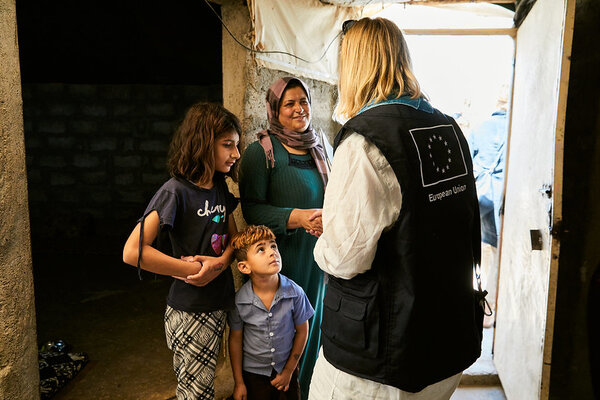
As global development grapples with a movement to “shift the power,” the sector must recognize that aid needs to be separated from geopolitics.
"For decades, critics have been claiming that aid is a key mechanism of foreign policy, highlighting that aid is inherently political. Politics, in turn, is controlled by geopolitical trends which are about amassing power and wealth. This is a fact that the global development sector as a whole has tended to conveniently ignore. The Western aid institutions that have been going through a reckoning and are talking about “shifting the power,” “decolonization,” or “localization,” were never altruistic. They were and remain political institutions based on state ideology of resource extraction and control."
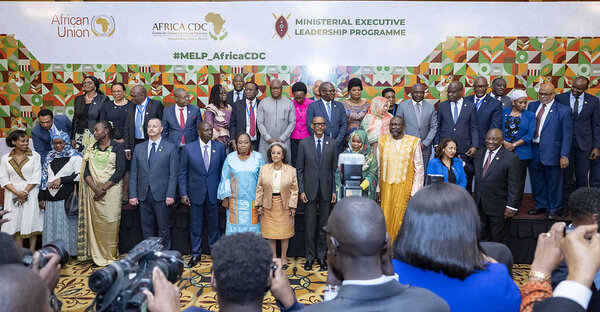
Second independence of Africa
"The Africa Centres for Disease Control and Prevention (Africa CDC), has announced the creation of a pooled African medicines procurement mechanism at the 37th African Union Summit, which ended yesterday. The mechanism aims to spearhead “a new era of predictable demand for African manufacturers, empowering them to plan for the long-term and establish a robust market worth over $50 billion,” said the CDC in a press release on Monday, just after the close of the Summit in Addis Ababa. (...) With regards to the new African CDC medicines procurement mechanism, Africa CDC Director General Dr. Jean Kaseya said: “The decision means the creation of a robust market for manufacturers and ensures the health security of all Africans. This will be the second independence of Africa.”
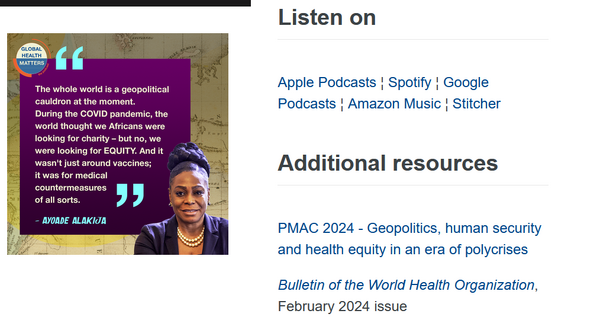
Geopolitics of global health - part 2
"In part 2 of our episode on the geopolitics of global health, host Garry Aslanyan speaks with Ayoade Alakija, who says "everyone in the health sector must have a basic understanding and training in geopolitics." Ayoade is the co-chair of the African Union’s African Vaccine Delivery Alliance and WHO Special Envoy and co-chair for the ACT-Accelerator. She speaks about the world becoming a “geopolitical cauldron” and how that directly influences global health practice and policy."

India is under pressure from EFTA, apparently led by Switzerland, which is home to several pharmaceutical giants such as Novartis and Roche.
"Commerce minister Sunil Barthwal has clarified that India will not sign a new trade agreement with the European Free Trade Association (EFTA) that would limit access by the country’s thriving generic medicine industry to new drug formulations for critical diseases. India is currently negotiating a new trade deal with the EFTA, which includes Iceland, Liechtenstein, Norway, and Switzerland. And leaked excerpts of the draft agreement had raised concerns among patients and advocates due to provisions limiting access and use by generic manufacturers of clinical trial data from originators’ drug trials, for a period of “up to six years.”

"Over 50 civil society groups have written to the leaders of the world’s biggest medicine procurement programmes urging them to reject “secrecy clauses” in their agreements with pharmaceutical companies. The letter, which has been shared exclusively with Health Policy Watch, was sent to the heads of UNICEF, the Pan American Health Organization (PAHO), vaccine alliance Gavi, The Global Fund to Fights AIDS, Tuberculosis and Malaria and the US President’s Emergency Plan for AIDS Relief (PEPFAR) on Tuesday. The civil society groups, which include the People’s Vaccine Alliance, Public Citizen, Health GAP and a multitude of local patient advocacy groups, express “deep concern about the increasing use of confidentiality and non-disclosure clauses” in contracts between drug manufacturers and government, multi-stakeholder and humanitarian buyers."

"NEW YORK/GENEVA/ROME, 21 February 2024 – In the less than five months that followed the brutal 7 October attacks and the ensuing escalation, tens of thousands of Palestinians – mostly women and children – have been killed and injured in the Gaza Strip. More than three quarters of the population have been forced from their homes, many multiple times, and face severe shortages of food, water, sanitation and healthcare – the basic necessities to survive. The health system continues to be systematically degraded, with catastrophic consequences. As of 19 February, only 12 out of 36 hospitals with inpatient capacity are still functioning, and only partially. There have been more than 370 attacks on health care in Gaza since 7 October."

ABS emerges as a cornerstone of potential outcome. By Priti Patnaik & Nishant Sirohi
"There is a distinct shift in the mood. Despite continuing divergences on key issues from technology transfer, financing, to access and benefit sharing, some countries are beginning to see a small possibility of concluding negotiations for a new Pandemic Instrument. However, the near-impossibility of reaching consensus on complex, technical matters within such a short time period, looms large in the hallways of the World Health Organization. With the number of remaining formal negotiating days ahead of May 2024 dwindling to single digits, WHO member states, nevertheless, continue to be keen on concluding talks to reach agreement in addition to finalizing amendments to the International Health Regulations. This emerging optimism could suggest two possibilities: a more likely one that could result in a watered-down agreement to meet the deadline, essentially a face-saving exercise; a second scenario - albeit somewhat rose-tinted, is that they would actually be able to put together a reasonable set of commitments that broadly meets the needs of most countries."
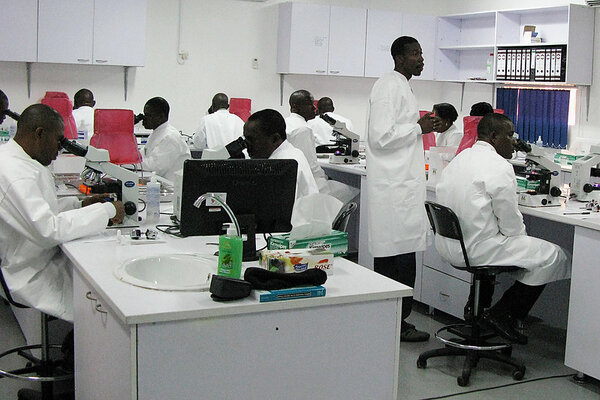
"A group of African scientists is urging their governments to demand a review of the role of global North-based international health organisations in shaping the new global pandemic preparedness and response treaty before its finalisation at the World Health Assembly in May. The group – known as the Pan-African Epidemic and Pandemic Working Group – says international health policies should prioritise low-income countries with high disease burdens, criticising the current draft as “colonialist”."
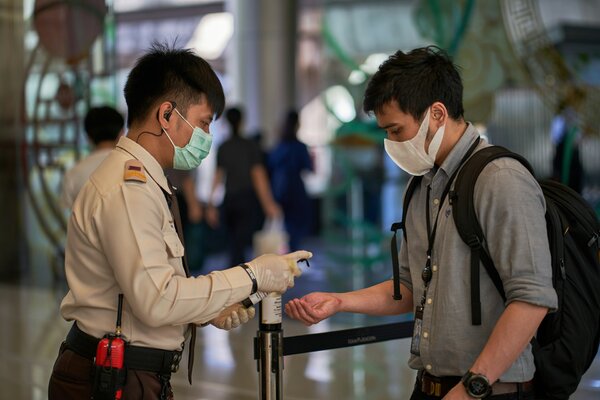
Far from making amends, a handful of powerful countries are sabotaging the best chance to translate the lessons from the COVID-19 pandemic into legally binding commitments that will protect us all.
"The Intergovernmental Negotiating Body (INB), which is tasked under WHO with drawing up an international instrument on pandemic prevention, preparedness, and response, will sit for the 9th and final time from March 18–29. In the 2 years since it first met, hundreds of hours and unknown costs have been spent, but the political impetus has died. The convention is now at a critical juncture: the final text for countries to ratify is due to be presented at the World Health Assembly in May. With only limited days of negotiation left and a long way to go to secure a meaningful agreement, it is now or never for a treaty that can make the world a safer place."
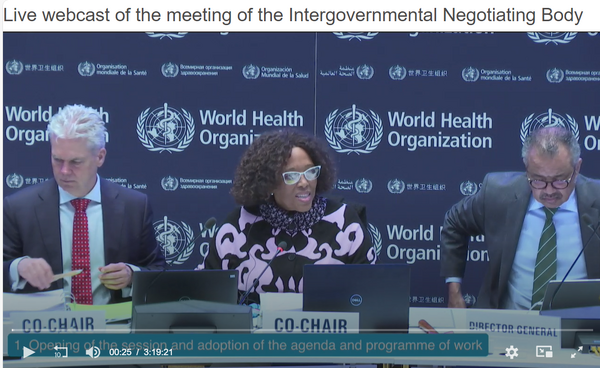
Strong Push for Access and Benefits Sharing Mechanism. By Priti Patnaik & Nishant Sirohi
"Scores of developing countries pulled their weight in a bid to push for equity provisions in a new Pandemic Agreement at the opening of the latest meeting of the Intergovernmental Negotiating Body (INB), set up to establish a new Pandemic Agreement. Despite strong intentions, it looks increasingly difficult that objectives to ensure equity in pandemic preparedness and response, will translate into any serious binding obligations, given limited political will and time. WHO member states are meeting for a two-week marathon meeting where they continue to discuss a proposal for a negotiating text put together by the Bureau of the INB, that to an extent reflects some of the deliberations conducted in smaller groups on a number of different key provisions."
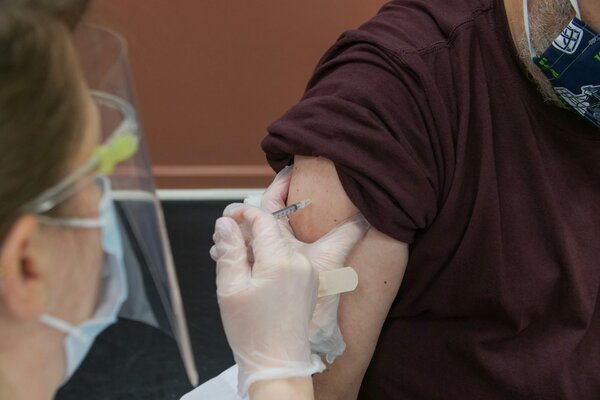
"Health Policy Watch has obtained portions of the latest draft of the pandemic agreement that member states will negotiate over at the eighth intergovernmental negotiating body (INB) starting on Monday, 19 February. At the time of publishing, only member states had access to the draft, although a number of civil society organisations recognised as stakeholders have requested a draft from the World Health Organization (WHO) Bureau that is overseeing the negotiations for some time."
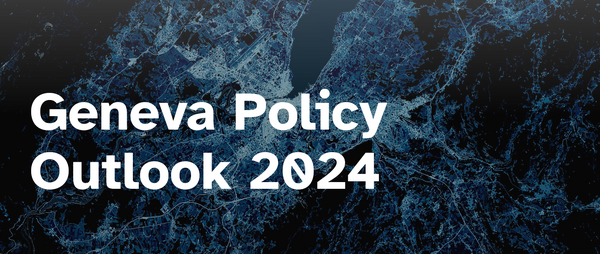
The Geneva Policy Outlook is an initiative led by the Geneva Graduate Institute in partnership with the Republic and State of Geneva, the City of Geneva, and the Fondation pour Genève.
"As a finger on the pulse of Geneva’s global policy space, the Geneva Policy Outlook 2024 (GPO24) gathers a selection of articles aimed to stimulate reflection on and provide practical impulses for international cooperation and global governance. It draws on the many exchanges throughout the year with senior policymakers from “International Geneva”, which serves as a global hub to address challenges through cooperation, dialogue and negotiation. While the GPO24 does not have the ambition to offer an all-inclusive coverage of policy issues, it does highlight the ‘can do’ attitude in Geneva’s policy circles."

"The Global Initiative on Digital Health (GIDH) is a WHO managed network of stakeholders organized to facilitate the implementation of the Global Strategy on Digital Health 2020-2025 and other WHO norms and standards for Digital Health System Transformation. The Initiative will serve as a platform to enable a wide global ecosystem to work collectively to promote country capacity and strengthen international cooperation in digital health. GIDH will prioritize the following core areas of work: assessing and prioritizing Member States’ needs, evaluating the availability and reporting of country-level digital health resources and identifying under-funded priorities, supporting technically and financially the accelerated achievement of the strategic objectives defined in the Global Strategy on Digital Health 2020-2025, building capacity and converging efforts to encourage developing, maintaining and adapting digital health technologies to continuously changing needs."

Bewerbungsfrist: 10. März 2024
Die Schweizer Partnerschaft HAS Haiti (SPHASH) ist ein gemeinnütziger Verein mit Sitz in Ilanz/Graubünden mit ungefähr 400 Mitgliedern und Sponsoren in der ganzen Schweiz. Einziger Zweck ist die ideelle, personelle und materielle Unterstützung des Hôpital Albert Schweitzer (HAS), Haiti. Der Verein hat über Jahre eine sehr erfolgreiche Basis aufgebaut. Aufgrund einer Nachfolge-Regelung ergibt sich die Möglichkeit für eine erfahrene Persönlichkeit, die nächste Phase des Vereins mitzugestalten und damit in eine weiterhin sehr erfolgreiche Zukunft zu führen. Aus diesem Grund suchen wir für die Schweiz, mit flexiblen Arbeitsort, per sofort oder nach Vereinbarung eine:n Geschäftsführer:in. Zusammen mit dem ausschliesslich ehrenamtlich tätigen Vorstand sind Sie prägend daran beteiligt, die Organisation zu formen und zu entwickeln. Wir freuen uns auf Ihre vollständige Bewerbung inkl. Lebenslauf und Motivationsschreiben bis zum 10. März 2024 an jobs@sphash.ch. Für weiterführende Informationen kontaktieren Sie den Präsidenten des Vereins, Benjamin Simeon, Telefon 079 290 49 79, email benjamin@sphash.ch oder den aktuellen Geschäftsführer, Rolf Maibach, Telefon 079 681 86 35, email rolf@sphash.ch.

Université de Lausanne "Cette soirée sera l’occasion de présenter le dispositif de soutien et d’encouragement des projets de recherche partenariale (recherche participative, recherche-action, recherche collaborative), de découvrir les expériences et expertises développées ces dernières années et de rencontrer nos partenaires autour d’intérêts communs. Un buffet sera servi à l’issue de la cérémonie. Le fonds de soutien à la recherche partenariale vise à soutenir des projets de recherche innovants et à fort impact social, développés entre des collaborateur·ices de l’UNIL ou des étudiant·es et des partenaires externes (communes, associations, ONG, services de l’Etat, etc.). L’entrée et libre, mais l’inscription est obligatoire."
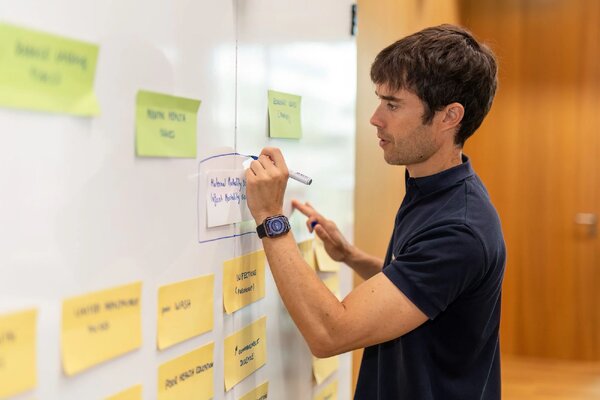
Swiss TPH In resource poor settings, health intervention managers and planners must give weight to strategies to successfully implement health projects and programmes, without losing sight of the demands and needs of populations. Therefore, the aim of this course is to equip participants with the knowledge and skills relevant to strategic planning, including approaches and tools for analysing the present situation (situation analysis), identifying problems and incorporating relevant stakeholders (priority setting).

Novartis Foundation "Together, we will discuss how cities can harness data and AI to tackle heart health inequities. This dialogue will convene global and city leaders in health equity and access, philanthropy, urban development, technology, data science and analytics to explore why data and multisector partnerships are essential to move the needle on population health and address the burning health issues of our time. Confirmed speakers: Please see attachment. JOIN US to explore together how cities can translate data insights into action and policy to tackle heart health inequities!"

Graduate Institute - Global Health Centre "(...) Deteriorating mental health in militarised territories is not exclusive to recent conflicts. The low-intensity but protracted military operations in the disputed territory of Jammu and Kashmir over more than three decades have contributed to the prevalence of depression in the region. Conflict-affected areas are also often characterised by insufficient resources for mental health. Humanitarian agencies struggle to provide even minimal levels of mental healthcare for populations in conflict zones. As violence intensifies and is prolonged, mental health comes to be characterised as a low-level priority or even as a luxury. This event aims to bring together experts to discuss different aspects of mental health crises and care, drawing on recent and ongoing cases."
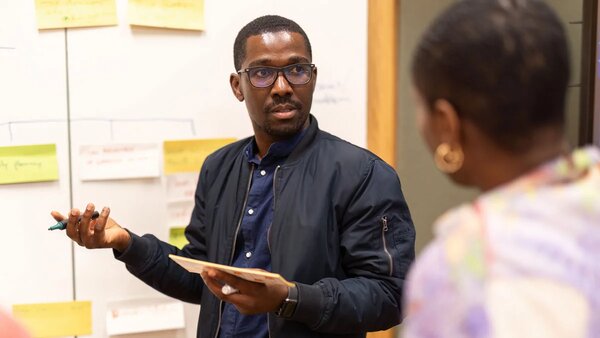
Swiss TPH The course analyses the relationships between global health strategies and national and local health policies and systems development. It focuses then on health systems frameworks, the role and behaviour of institutions and stakeholders, the major innovations in financing and delivering health services, and on how health systems are responding to global changes.
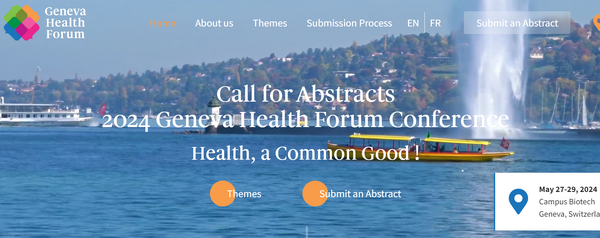
Geneva Health Forum "Universal healthcare coverage stands prominently among the World Health Organization’s (WHO) three strategic priorities. The rise in health disparities worldwide underscores the inadequacy of relying solely on market mechanisms to ensure access to healthcare. In response, the WHO is advocating for the development of “common goods for health,” which encompass population-based functions or interventions demanding collective financing, whether by governments or donors."